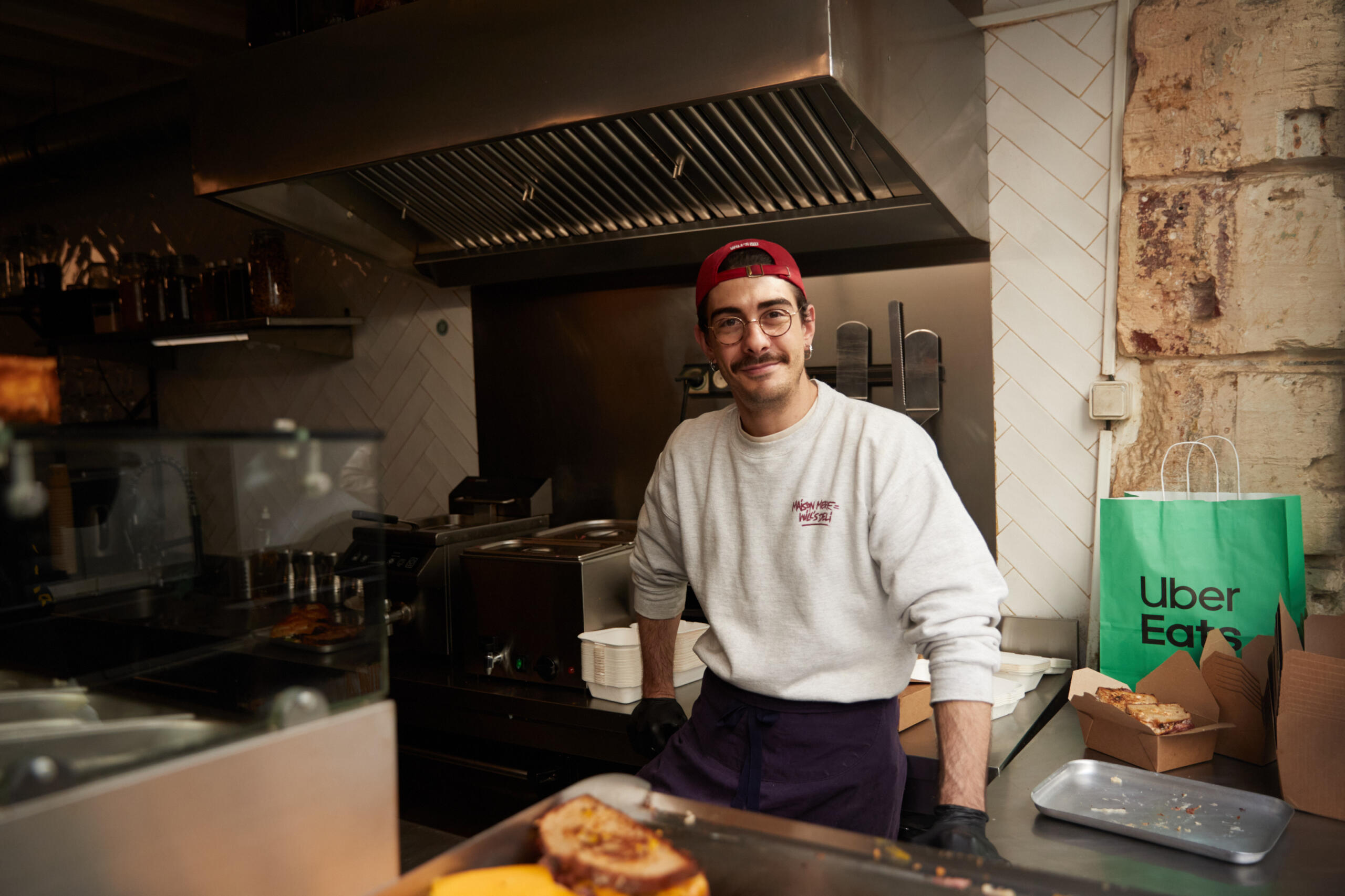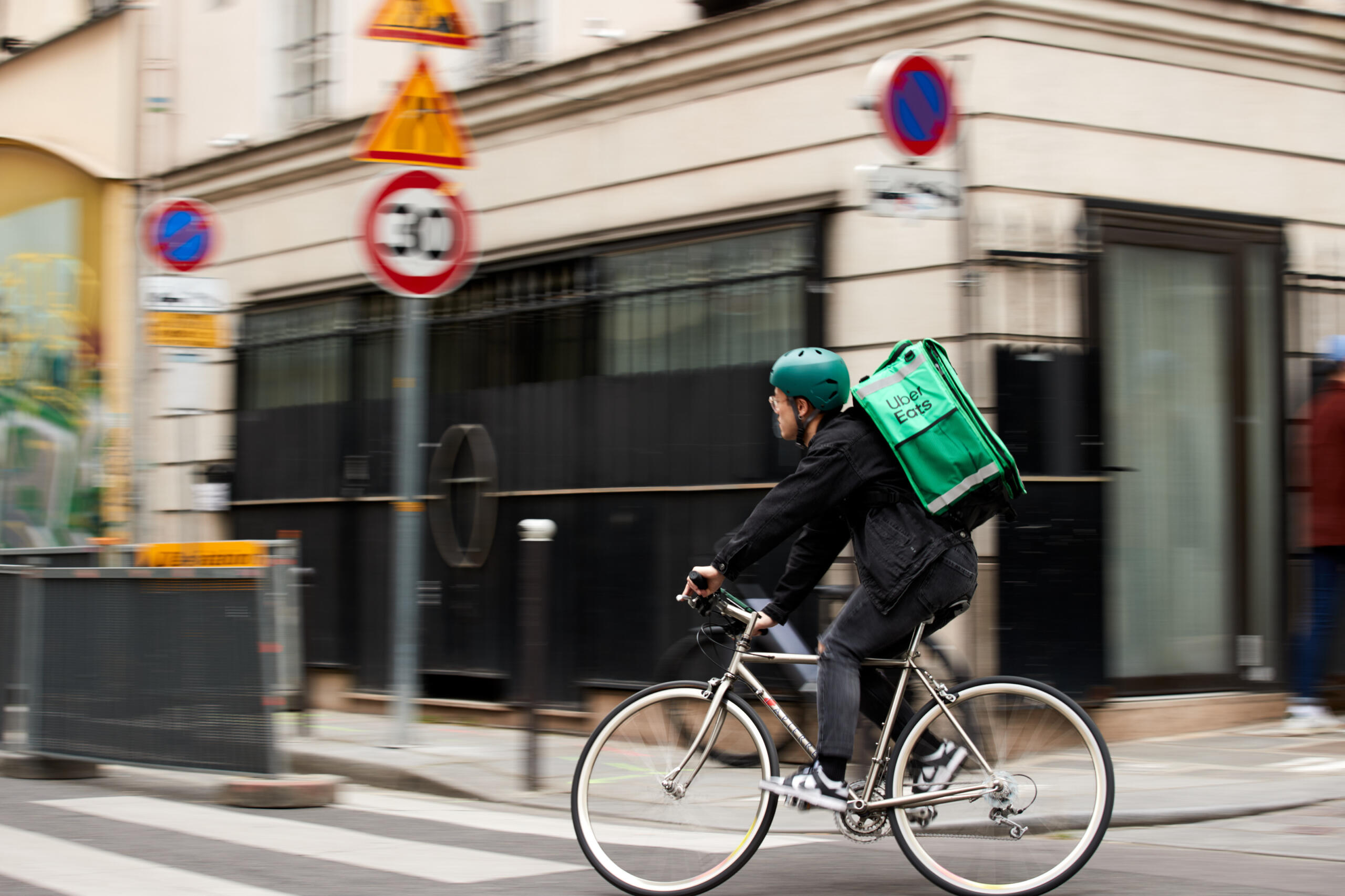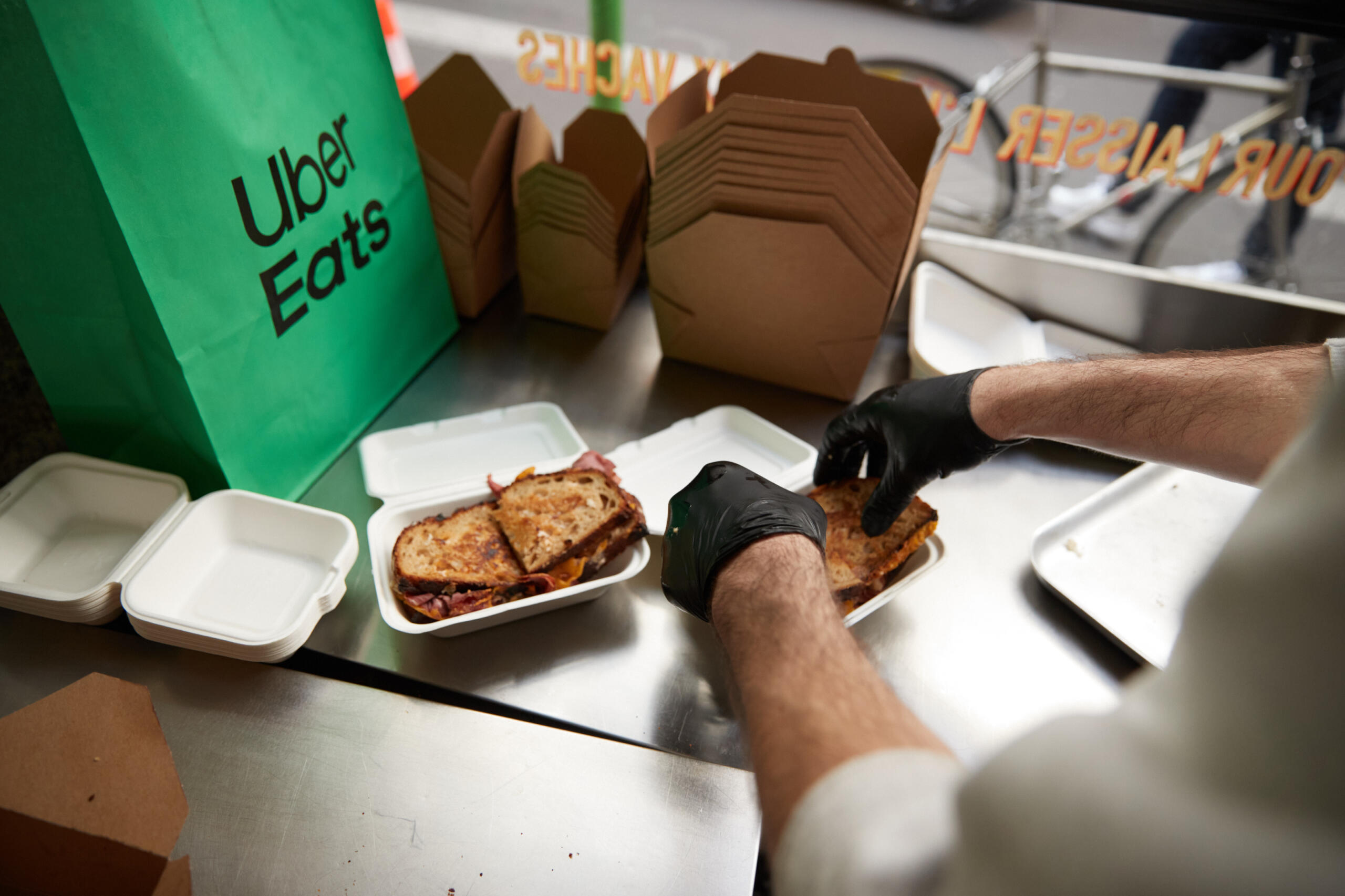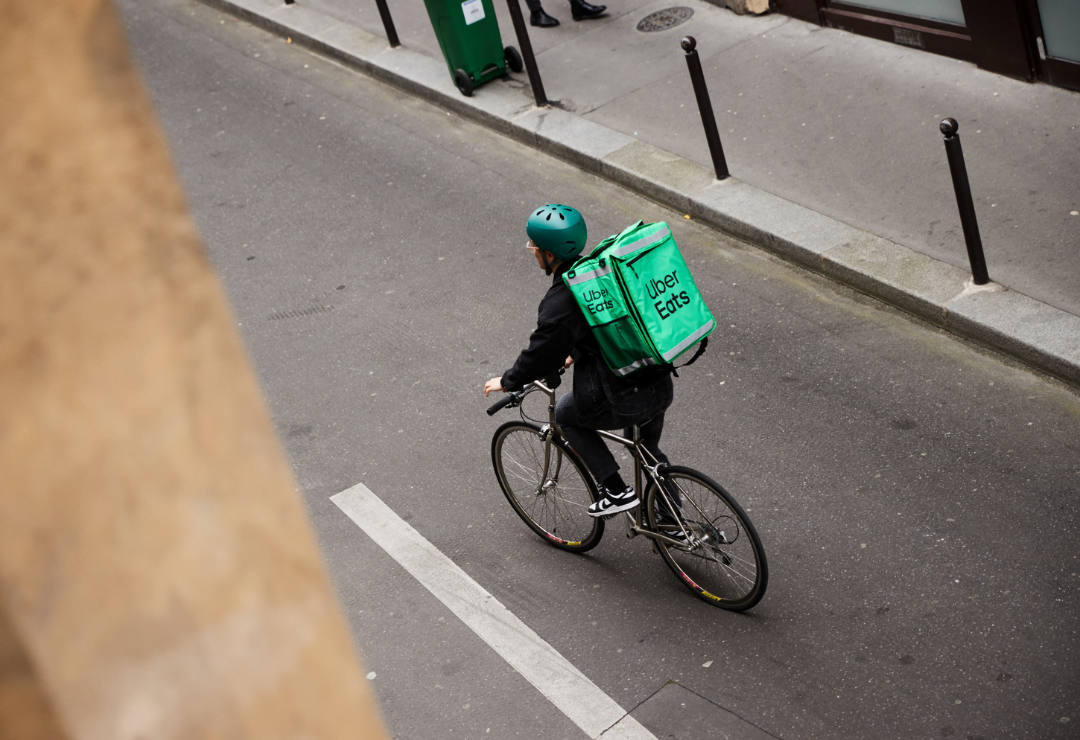Uber Makes a Shift
Eve Henrikson, General Manager of Uber Eats for Europe, discusses the sustainable transformation of Europe’s home delivery sector, from innovative approaches to tackling environmental challenges and the vital role of collaboration in driving change.
An interview with Eva Henrikson, elaborated by Karen Vancluysen.
POLIS: In your role overseeing the activities of a leading delivery platform across Europe, how have you observed the delivery landscape in Europe evolving? What are the key trends driving change in the sector?
Eve Henrikson: Our platform focuses on connecting merchants, couriers, and customers to answer their needs and add value to all parties involved. Since our European launch in 2016, demand for delivery services has significantly increased. Today, Uber Eats operates in more than 3,000 cities across 12 European countries, offering opportunities to hundreds of thousands of couriers and merchants while providing millions of customers with delivery services.
POLIS: As the EU Green Deal gains momentum, several companies have set zero-emissions targets. What are the main strategies and initiatives that organisations like yours are implementing to achieve these goals, and how realistic are these commitments?
Eve: At Uber Eats, we believe in a clean future for the planet, and in doing our part. It is good for customers, merchants, and cities. We can play a catalytic role in this system, and that’s why we have committed to becoming a zero-emission platform by 2030, in line with the European Green Deal. There are multiple paths to achieving this vision, and we cannot do this alone but believe our continuous investment in operations and data-driven approach can make a substantial contribution.

Uber Eats (all photos). Credit: Uber Eats
Couriers using our platform need more support to transition towards greener and safer modes of transport and adapt to the environment they work in, especially in high-density city centres. To support them and make our roadmap a reality, we are partnering across Europe with bike providers such as Go Sport, thus ensuring that couriers using our platform have access to affordable and clean transport modes.
Additionally, we are collaborating with experts and associations, drawing upon their knowledge and expertise to help us navigate challenges and make informed decisions on our path to zero emissions. Transparency and accountability play a key role in our journey, which is why we are committed to reporting on our progress and holding ourselves accountable for the promises we have made.
POLIS: Urban centres across Europe are grappling with the potential negative impact of rapid delivery growth, such as air and noise pollution. How are delivery platforms addressing these issues to promote more sustainable urban environments?
 Eve: We believe that working closely with local authorities and communities is essential in finding targeted solutions to specific challenges. Our team includes hundreds of city managers across Europe who are responsible for engaging with local authorities, fostering dialogue, and implementing tailor-made actions in partnership with each city. For example, we recently partnered with the city of Bourges in France to develop joint communications aimed at raising awareness among couriers about noise pollution caused by pollutant vehicles in urban centres. This initiative also informs couriers about the public subsidies available for purchasing e-bikes. Our experience in European countries has provided valuable insights and lessons that we can draw from to offer sustainable solutions adaptable to different local contexts.
Eve: We believe that working closely with local authorities and communities is essential in finding targeted solutions to specific challenges. Our team includes hundreds of city managers across Europe who are responsible for engaging with local authorities, fostering dialogue, and implementing tailor-made actions in partnership with each city. For example, we recently partnered with the city of Bourges in France to develop joint communications aimed at raising awareness among couriers about noise pollution caused by pollutant vehicles in urban centres. This initiative also informs couriers about the public subsidies available for purchasing e-bikes. Our experience in European countries has provided valuable insights and lessons that we can draw from to offer sustainable solutions adaptable to different local contexts.
POLIS: Sustainability efforts in the delivery sector extend beyond zero-emission targets to include waste reduction. What role can platforms play to minimize waste generation?
Eve: Addressing packaging waste is vital to our sustainability efforts. Our ambitious goal is to achieve 100% sustainable packaging globally by 2030, with an interim target of 80% in the EU by 2025.We understand that the choice of packaging ultimately lies with the merchants; however, we aim to empower them to make more sustainable choices by providing them with the necessary tools and resources.
 To make this possible, we are partnering with sustainable packaging providers such as Dinovia, Enviropack, and Bunzl in every EU market. These partnerships enable all restaurants on our platform to access and purchase sustainable packaging at reduced costs. This way, we can help merchants transition to eco-friendly packaging solutions without compromising their budgets.
To make this possible, we are partnering with sustainable packaging providers such as Dinovia, Enviropack, and Bunzl in every EU market. These partnerships enable all restaurants on our platform to access and purchase sustainable packaging at reduced costs. This way, we can help merchants transition to eco-friendly packaging solutions without compromising their budgets.
We are also collaborating with experts such as the World Wildlife Fund and the Rocky Mountain Institute to ensure that our approach is effective and well-informed. Furthermore, we recognise that many cities across Europe have launched ambitious zero-waste programmes. We are eager to join forces with these cities and contribute to the success of their actions.
POLIS: What are the primary challenges in achieving zero emissions within the delivery sector and how important is collaboration with cities, local authorities and other stakeholders in achieving a sustainable future for the delivery sector?
Eve: Achieving zero emissions is indeed a challenging endeavour, and its success depends on the collective efforts, investments and commitments of various stakeholders, including bike manufacturers, providers, public authorities, and private entities. One of the most pressing challenges is making affordable e-bikes available to couriers. Uber Eats is committed to investing in initiatives that facilitate access to sustainable transportation options for couriers. However, we also need the support of national and local regulators to direct public aid towards professionals, especially low-income workers who should be able to purchase reliable e-bikes at a reasonable price.
 Another key obstacle is the lack of suitable infrastructure for cyclists, such as protected bike lanes or charging stations. Uber Eats is eager to contribute by sharing data and recommendations that can guide the deployment of infrastructure where it is most needed. We believe that collaboration between the public and private sectors is crucial in creating an urban environment that supports and encourages sustainable transportation.
Another key obstacle is the lack of suitable infrastructure for cyclists, such as protected bike lanes or charging stations. Uber Eats is eager to contribute by sharing data and recommendations that can guide the deployment of infrastructure where it is most needed. We believe that collaboration between the public and private sectors is crucial in creating an urban environment that supports and encourages sustainable transportation.
Lastly, Uber Eats supports local regulations aimed at accelerating the transition towards zero emissions while simultaneously boosting economic growth. Examples of such regulations include the implementation of congestion charges or the establishment of low-emission zones. By working closely with policymakers and other stakeholders, we can collectively overcome the challenges on the path to a greener future for the delivery industry.
Click here to read the article in its original format.
About the contributors:
Karen Vancluysen was appointed as Secretary General of POLIS in September 2014, after having been the network's Research Director for 8 years. Since 1998, she has been involved in urban mobility networking, innovation, and policy activities as well as a wide range of European urban transport research projects.
Eve Henrikson is the Regional General Manager in Europe, Africa and the Middle East for Uber Eats. She has extensive international experience in digital, spanning over 20 years in various industries across Europe, America, and Asia. She has held leadership positions in e-commerce for fashion, food, and technology. Additionally, Eve serves as an independent non-executive director at Lloyds Bank Corporate Markets PLC and Sonae SGPS SA.
